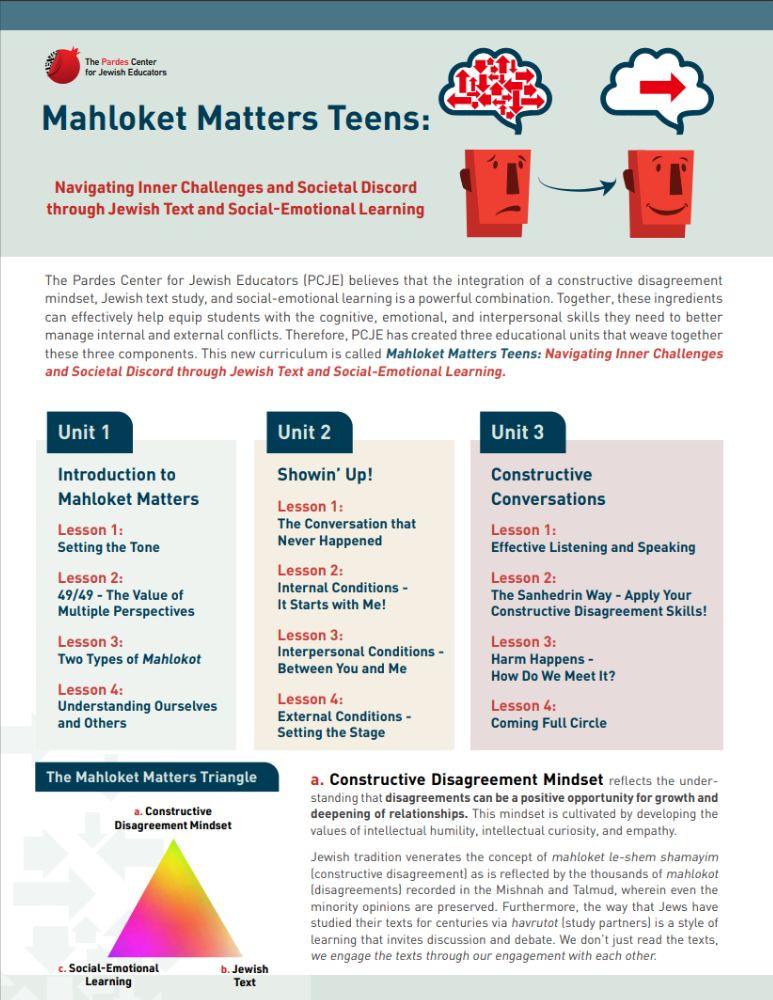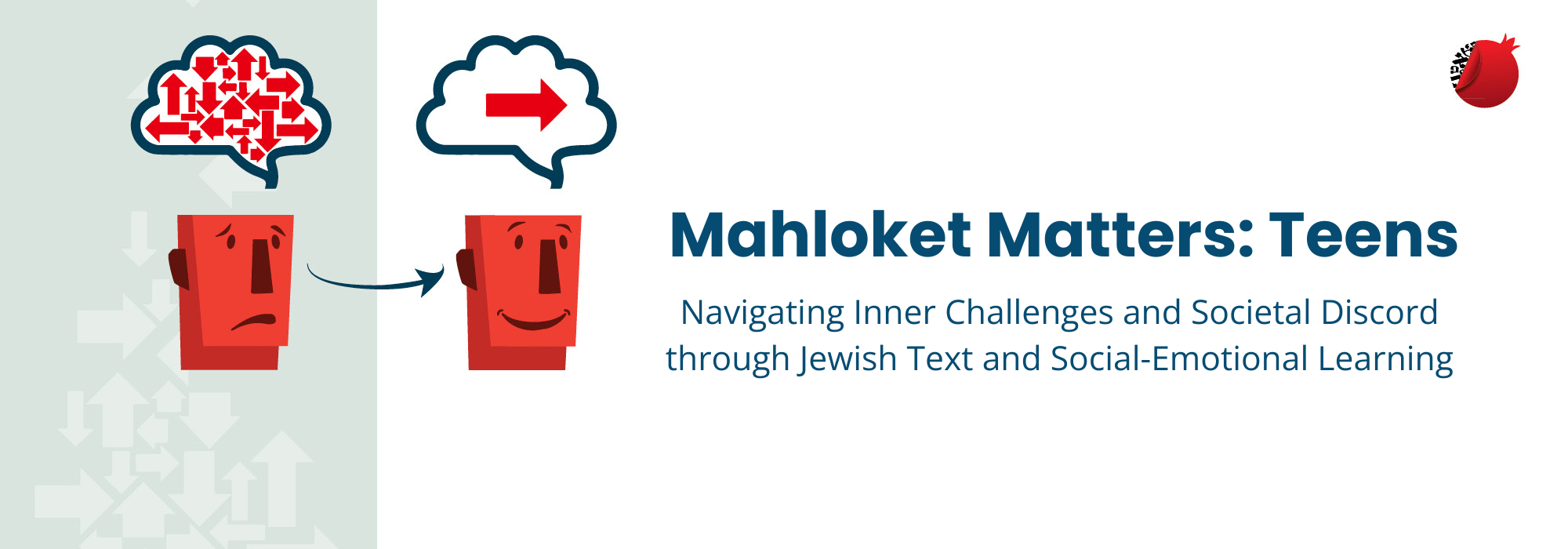We are living in a time period in which extreme political polarization and demonization of the other is the status quo. This challenging environment is particularly stressful and draining on adolescents as they navigate the tricky tension between forming an individual identity and a competing need for social belonging.
How can we help our high school and upper middle school students meet these challenges?
The Mahloket Matters Teens Curriculum
The Pardes Center for Jewish Educators (PCJE) believes that the integration of Jewish text study with Social-Emotional Learning can help equip students with the cognitive, emotional, and interpersonal skills they need to better manage internal and external conflicts.
As such, PCJE has created a new curriculum for high school and upper middle school students called Mahloket Matters Teens: Navigating Inner Challenges and Societal Discord through Jewish Text and Social-Emotional Learning. These interactive materials foster a constructive disagreement mindset via Jewish text study and Social-Emotional learning.
The curriculum consists of three versatile units that can be used for in-person or distance learning. They can also be integrated in a variety of contexts. For example, a day school or congregational school may choose to incorporate all or parts of the curriculum into its Judaic Studies classes, advisory program, debate club, or as a special theme for the school year. Youth groups or camps might choose to use all parts of the curriculum to help train teens as skillful madrichim (leaders) who can run text study, discussions, and activities revolving around constructive disagreement.
Each unit comes with a comprehensive educator’s guide, editable student workbook, and editable slides.
Essential Questions Addressed in Each Unit
Unit 1. Introduction to Mahloket Matters
- How can students and teachers work together to create a positive learning environment?
- What is the point of interacting with people who disagree with me?
- What distinguishes a mahloket le-shem shamayim from a mahloket lo le-shem shamayim?
- Why do good people sometimes disagree with each other on moral issues?
Unit 2. Showin' Up!
- Who or what torpedoed the potential conversation between Moses, Dathan, and Abiram in the Book of Numbers, chapter 16?
- What physiological clues can help me identify whether or not my brain is ready to engage productively in a difficult conversation? If I am not ready, how do I become ready?
- When I am emotionally triggered, how can I re-regulate my nervous system so that I can access reason, empathy, and critical thinking?
- How can I identify my needs and motivation in order to create a clear and productive intention for engaging in a difficult conversation?
- How do I craft an invitation to a difficult conversation that is welcoming, honest, and non-aggressive?
- How might the setting – where, when, how, and who – impact the development or outcome of a difficult conversation?
Unit 3. Constructive Conversations
- What are some of the crucial skills necessary for engaging productively in a difficult conversation?
- How can the procedures of the ancient Sanhedrin (the Jewish High Court) model for us how to disagree constructively today?
- How can we constructively communicate with someone with whom we are upset in ways that will both address the issue and not hurt the relationship?
- How does the power of human connection factor into constructive communication?

Accessing the Curriculum
We are delighted to share the Mahloket Matters Schools curriculum with you!
The Mahloket Matters curriculum costs $500.
Please submit this brief registration form in order to be directed to the payment page.
Once you have purchased the material, you will receive an email with information about downloading the curriculum.
Educator Success Stories
“I have been teaching a teen class using this curriculum. Now they really understand the importance of multiple perspectives. They have requested to learn more about Israel, specifically the issues surrounding conflict, and I’m using these tools to shape and guide that conversation.“
– Abra Lee,
Director of Jewish Education & Learning Initiatives,
Congregation B’nai Jeshurun (Short Hills, NJ)
“We noticed that in the middle school culture, where it is seen as cool to put each other down, there was a bit less of this style of engagement happening. We began to see how Toshba (rabbinics class) was impacting our students’ everyday behavior for the better.“
– Jennifer Newfield and Derek Rosenbaum,
Charles E. Smith Jewish Day School (Maryland)
Published in the Lookstein Center’s Jewish Educational Leadership, “Tokheha Leshem Shamayim”
For More Information
For more information about the curriculum or if you are interested in additional professional development options,
please email Sefi Kraut sefik@pardes.org.il.
About the Pardes Center for Jewish Educators
The Pardes Center for Jewish Educators trains and empowers experiential educators, day school teachers and adult educators to serve as knowledgeable, skilled, reflective and passionate professionals for the Jewish world.
Graduates of the Pardes Center for Jewish Educators teach and inspire youth and young adults in Jewish day schools, Hillels, synagogues, camps, environmental education venues and experiential settings in communities across North America.

